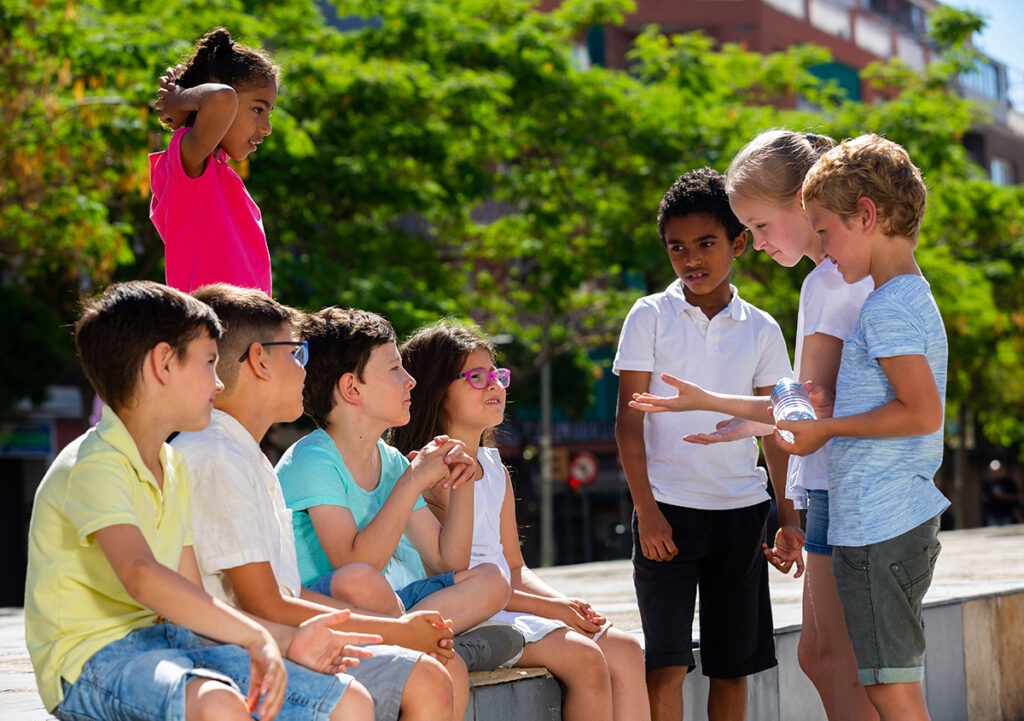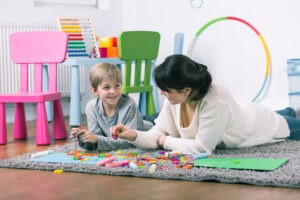According to the Centers for Disease Control and Prevention (CDC), more than 90% of the U.S. population lives in an area with “low or medium Covid-19 community level”.
Statistics like these have led to many places lifting mask mandates and allowing more individuals to gather together.
But as life starts to progress “back to normal”, we might notice a continued impact from the Pandemic in how children interact with others.
Impacts of Restrictions on Social Skills
Some educators have reported school-aged children showing less confidence while participating in group activities.
One study published in April 2022 showed toddlers and preschoolers struggling more with age-appropriate social skills such as sharing and turn taking during the pandemic.
Babies have been found to show more difficulty understanding facial expressions. This could be related to having limited social interaction with peers. Daycare workers that were previously required to wear masks may have also been a contributing factor.
Even adults who experienced isolation, reduced face to face interaction, and a limited social network during the Coronavirus may be out of touch with using some daily social skills appropriately.
How to Help Your Child Brush Up on Social Skills
According to an article posted by UNICEF, children’s “social skills are out of practice, and parents may need to provide children with more coaching and explicit instruction than they have had to in the past.”
Prepare Your Child for New Activities & Experiences
Practice Conversational Skills at Home
- How to join a conversation.
- Initiating a new conversation.
- Maintaining a conversation.
- Finishing a conversation.
Activities for Building Social Skills
- Role Playing. Act out different social situations at home with family members.
Example activity: Practice topic maintenance by having a conversation with your child during which you make a few off-topic comments. How does that make him or her feel?
Skills developed: Your child can learn to take another person’s point of view by experiencing how some “unexpected” social behaviors can make others feel.
- Take Note of TV Shows. Paying extra attention to some of the social situations on TV shows can be a good way to understand appropriate ways to interact and have a conversation with others.
Example activity: Look for scenes in your child’s favorite movie or TV shows that show examples of social behaviors. If there’s a scene where one child joins in a conversation with a group, talk afterward about how he or she did that.
Skills developed: Appropriate ways to maintain a conversation (like asking follow-up questions and making on topic comments), and example phrases (such as “It was good seeing you! I have to get going soon…” to wrap up a conversation).
- Charades for Feelings. Understanding and practicing non-verbal communication are crucial for ramping up to engage in more social environments.
Example activity: Play a game of charades where you and your family act out different emotions.
Skills developed: This can encourage everyone to watch different facial expressions and body language closely and try interpreting their meaning.
Then, when in social situations with others outside of home, everyone will be more conscious of how their own non-verbal communication (and that of others) impacts communication.
If you’re having a conversation with someone and they’re looking away or have a facial expression indicating their boredom, it might be time to switch topics or give them a chance to talk.
Additional Resources
Many of us are feeling excited that the world is getting a little more “back to normal” with most Covid 19 restrictions being lifted. Brushing up on some basic social skills can help families return to socializing more with others.
If you have concerns about your child’s social or communication skills, he or she may benefit from specialized services from a Speech-Language Pathologist. A Speech Therapy evaluation can help determine what difficulties your child is having. Ongoing individualized therapy can include techniques and activities to help improve these areas.
TherapyWorks offers Speech Therapy, Occupational and Physical Therapy both in person and through teletherapy. If you would like to learn more, or discuss your child’s specific needs, please don’t hesitate to reach out to TherapyWorks!




